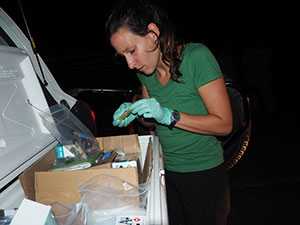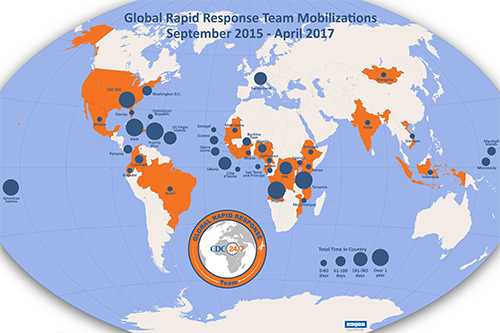CDC Global Rapid Response Team
On This Page
What We Do: Respond Rapidly to Global Emergencies
CDC’s Global Rapid Response Team (Global RRT) is a unique resource that can rapidly respond to global public health concerns, both within the U.S. and abroad. In 2016, Global RRT staff spent more than 9,000 person-days in over 90 responses to cholera, yellow fever, Ebola, measles, polio, mass gatherings, and natural disasters.
The Global RRT is a readily deployable team of public health experts coordinated from CDC Headquarters in Atlanta, Georgia, with dedicated full-time staff from across the world. We have more than 400 surge staff, with more than 50 ready to deploy on short notice. Some Global RRT staff remain in the field during an emergency response for up to six months.
The Global RRT:
- Responds to emergencies when and where they occur to stop health threats before they reach our shores
- Provides long-term staffing for international emergency responses in the field and at CDC headquarters
- Deploys field-based logistics, communications, and management and operations experts to support emergency response
- Helps partner countries achieve core global health security capabilities linked to the Global Health Security Agenda (GHSA) and International Health Regulations (IHR)
- Capacity building
- Coordination
- Epidemiology
- Field logistics
- Health promotion
- Lab support
- Long-term staffing
- Management
- Partnership building
- Rapid assessment
- Risk communication
- Surveillance
Why It’s Important
The Global RRT can provide support and expertise in…
The high-stakes Ebola epidemic of 2014 might have had devastating impacts on the United States if CDC and its partners hadn’t been able to contain the outbreaks in West Africa. Public health agencies worldwide learned many lessons from the Ebola response, one of which is that we need a readily available group of public health responders who can deploy to control diseases from the moment we detect them.
Global RRT increases the efficiency and effectiveness of CDC’s overall response capability by filling key positions in the field and at headquarters when emergencies occur. This improves global health security by increasing our ability to quickly respond to health threats and growing a stronger global emergency workforce.
How We Do It
We identify and develop a trained, deployable, multi-disciplinary emergency workforce at CDC.
The Global RRT has dedicated staff, as well as surge staff from across CDC. Dedicated staff are hired full-time to work on the Global RRT, while surge staff maintain their current positions and mobilize when needed for emergency responses. All Global RRT staff become deployment ready (including medical clearances) and complete safety, security, technical, and contextual training.
We can rapidly deploy up to 50 public health experts internationally or to the CDC Emergency Operations Center.
At any given time, Global RRT dedicated and surge staff are available to deploy to support or lead a range of emergency response activities. The Global RRT coordinates with other CDC experts who monitor and respond to infectious and non-infectious global health threats.

We provide stable, long-term staffing for emergencies when a sustained agency response is a priority.
The placement of staff with experience in emergency management improves communication and coordination within the agency and between CDC and its partners.
We serve as CDC’s link to key global health emergency partners.
The Global RRT coordinates and partners with both U.S. Government and national and international partners who respond to global health emergencies. This includes the U.S. Agency for International Development (USAID) Office of Foreign Disaster Assistance (OFDA), which is responsible for leading and coordinating the U.S. government’s response to disasters overseas. The Global RRT also works closely with the Global Outbreak Alert and Response Network (GOARN).
We help partner countries meet obligations to international global health security agreements.
Our work helps countries meet global health security goals related to workforce development; emergency operations; linking public health with law and multi-sectoral rapid response; and medical countermeasures and personnel deployment.
- Page last reviewed: August 8, 2017
- Page last updated: August 8, 2017
- Content source:


 ShareCompartir
ShareCompartir
